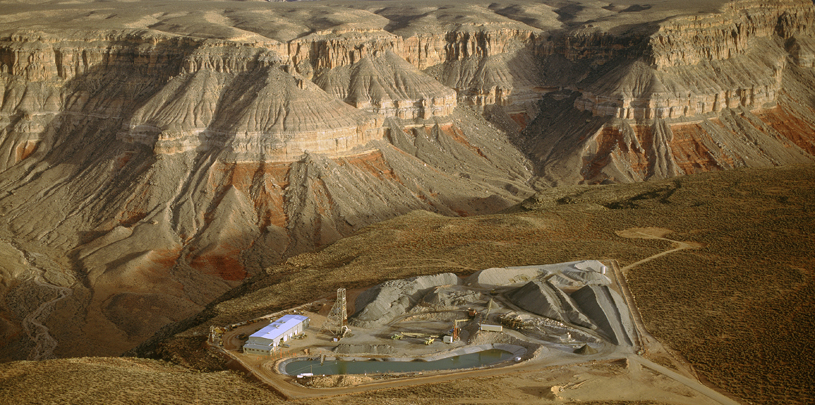
The court ruled that VANE doesn’t have a property interest in unpatented mining claims, for which VANE had sought $123million in “takings” from the U.S. Had they won, VANE’s could have made the government pay for mining claims that VANE hadn’t proven to be economically valuable, and for which VANE hadn’t established valid rights to mine. Such a result would make the uranium-mining ban (and any other “mineral withdrawal” on public lands for that matter) too expensive for the federal government, effectively re-opening Grand Canyon’s watersheds to dangerous new mines while undoing years of advocacy by Grand Canyon Trust and its members and partners. If VANE appeals the ruling, we’ll likely intervene. You can read more about the suit details in this recent article by E&E Publishing:
Manuel Quiñones, E&E reporter
Published: Monday, May 5, 2014
The U.S. Court of Federal Claims has tossed a uranium exploration company's lawsuit against the Obama administration over its 2012 decision to block new mining claims on roughly 1 million acres around the Grand Canyon National Park.
Judge Susan Braden last week said Vane Minerals LLC's request for almost $80 million in compensation for 678 company mining claims and exploration activities in the affected area was not ripe for discussion.
Vane Minerals argued that the Bureau of Land Management and the Forest Service are not letting the company explore its existing mining claims.
Even though the Obama administration's withdrawal does not affect existing mining claims, regulators are only honoring claims proved to be valid. In other words, they must go through a test showing they contain economically recoverable mineral reserves.
Braden sided with the Obama administration in saying that Vane needed to go through a validation process before determining how the withdrawal will affect its claims.
"Unless and until Plaintiff receives a [valid existing rights] determination," she wrote, "neither the BLM, the Forest Service, nor this court can determine if and how the Withdrawal Order will impact Plaintiff's unpatented mining claims."
In its own court filings, Vane Minerals argued that it shouldn't have to go through the validation process because the government is well aware of the rich uranium deposits around the Grand Canyon.
The company also argued that the withdrawal made it harder to conduct the necessary exploration to prove validity -- and that having to prove validity amounted to a new regulatory burden.
"Had the segregation, and later withdrawal, not been in effect, the Forest Service would not have required mineral examinations or demonstrations of mineral discoveries as a condition of approving VANE's plans of operations," the company wrote in a court filing.
It added that "the value of VANE's mining claims has significantly decreased. Moreover,VANE must pay annual fees to maintain its claims, even though it is effectively barred from developing them."
But Braden, in her 23-page opinion, wrote, "Congress has authorized the Department of Interior to determine the validity of mining claims on the public lands."
"In this case," she concluded, "Plaintiff failed to obtain a VER determination and consequently has no property right."
Taylor McKinnon, energy director for the Grand Canyon Trust, described the case as an uranium industry attempt to "raid" the U.S. Treasury. "Dismissal of this case is good news for the American public and Grand Canyon National Park," he said.
An attorney for Vane Minerals said this morning the company was mulling its options. It can appeal to the U.S. Court of Appeals for the Federal Circuit.
While Braden's ruling is a win for opponents of uranium mining around the Grand Canyon, more significant litigation is pending in Arizona U.S. District Court involving numerous companies and groups, including the National Mining Association and the Nuclear Energy Institute.
The groups and companies argue that a section of the Federal Land Policy and Management Act allowing for congressional resolutions of disapproval is unconstitutional and, therefore, so are 5,000-acre-plus withdrawals.
Last year, Judge David Campbell agreed with the mining and nuclear industries in finding the resolutions unconstitutional, but he said that didn't invalidate the withdrawals.
Companies have signaled their interest in appealing Campbell's decision (Greenwire, July 16, 2013). However, other parts of the case remain pending, including whether the Obama administration followed the National Environmental Policy Act in approving the withdrawal.
A rally in Salt Lake City followed by a spiritual walk in White Mesa demonstrate the Ute community's determination to see uranium mill close.
Read MoreArizona Governor Katie Hobbs is the latest elected official to call for an environmental review of Pinyon Plain uranium mine.
Read MoreFour of the five most dangerous sections of the haul route are on the Navajo Nation.
Read More